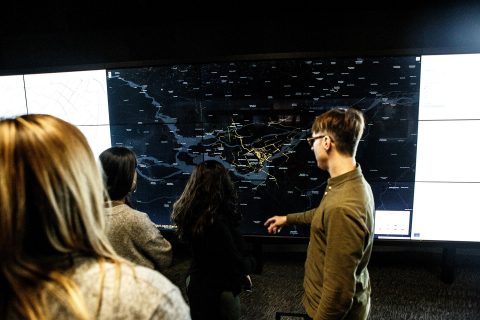Educational Studies (MA)
Program overview
The MA in Educational Studies focuses on alternative possibilities in education, with a strong commitment to social justice and putting theory into practice. Drawing from disciplines like sociology, philosophy, anthropology and adult education, the program combines critical theory with an international approach. As a student in our program, you will develop a diverse set of research skills that allow you to analyze complex educational problems with insight and depth. You will graduate able to influence policy and practice in a variety of educational settings. A wide variety of funded research projects are underway, ranging from fighting hate speech and radicalization to developing innovative software for cooperative learning. Our researchers will help you identify your research interests and support you through the completion of your final project. Graduates can either continue their studies or pursue a variety of exciting opportunities in non-profit and educational fields.
Program structure
Degree Requirements
Fully-qualified candidates are required to complete a minimum of 45 credits.
Please see the Education Courses page for course descriptions.
Educational Studies MA (45 credits)
Educational Studies MA with Thesis
| 6 | credits minimum of Core Courses:
|
| 18 | credits of Elective Courses |
| 21 | credits:
|
Educational Studies MA with Directed Study
| 12 | credits minimum of Core Courses chosen in consultation with an academic advisor:
|
| 21 | credits of Elective Courses |
| 12 | credits:
|
Concentration in Adult Education
In either the thesis or directed study option, students may complete a concentration in Adult Education. As part of the required core courses, students must take ESTU 670 and three 3-credit courses chosen from Adult Education Courses .
Adult Education Courses
| 9 | credits chosen from:
|
Admission requirements
Admission Requirements
- Undergraduate degree with a minimum GPA of 3.00 (B average) with an appropriate concentration in a field of study relevant to Educational Studies.
- Minimum of two years professional activity in education or an undergraduate record which includes at least three courses in education, each with a grade of B or better.
- Proficiency in English. Applicants whose primary language is not English must demonstrate that their knowledge of English is sufficient to pursue graduate studies in their chosen field. Please refer to the English language proficiency page for further information on requirements and exemptions.
Application process
Application deadlines

FALL
December 1 (all applicants)

WINTER
n/a

SUMMER
n/a
Priority will be given to complete applications submitted by the deadline. In some cases, programs may continue to accept applications as long as there is space available.
International students: Considering the waiting period involved in meeting the entry requirements to Canada and Quebec, we strongly encourage international applicants to apply early and submit supporting documents prior to the deadline.
Tuition & funding
Tuition and fees
Tuition and fees of the program may depend on your student status, among other key factors. Estimate these costs based on the most common situations.
Awards and funding
Funding packages are generally available for students in thesis-based programs. They come in the form of awards, teaching and research assistantships are offered at the time of admission to most students to allow them to focus on their research and studies. Research and thesis-based students are automatically considered for all entrance graduate awards when they apply to Concordia, provided they meet eligibility criteria. No separate application is required.
The Quebec and Canadian governments offer a number of competitive graduate scholarships. We encourage you to apply for these awards at the same time you are preparing your application.
Out-of-province students
Get up to $9,251 in special funding for master's programs. Learn more
Other programs of interest

Identify educational problems and apply developments in psychology, information/communication and technology, management and systems analysis to solve them in your consultancy as an education technology professional.
Department
Faculty

Enrol alongside school administrators, business managers, nursing educators and other professionals in the training of adult education methods and techniques.
Department
Faculty


